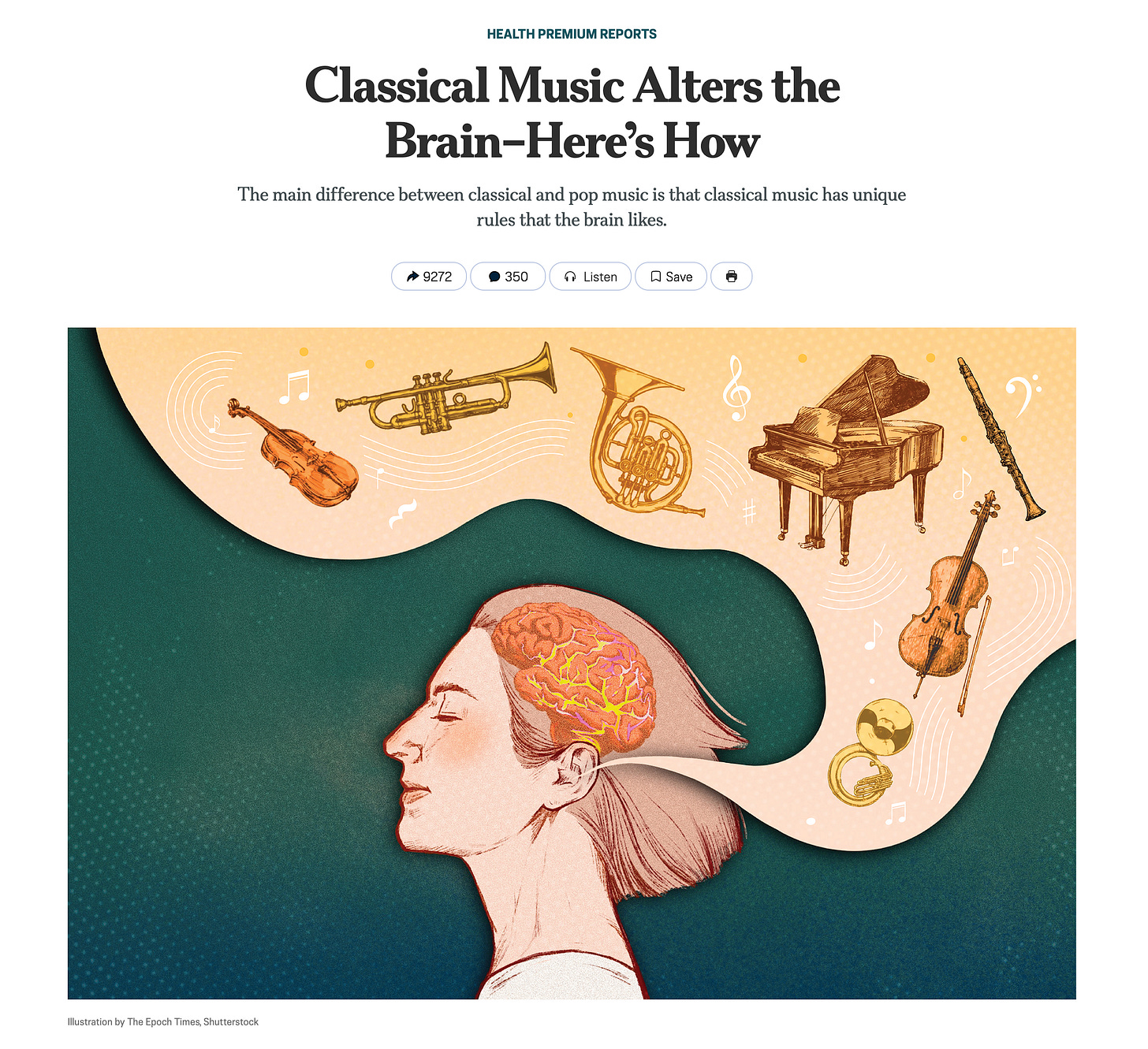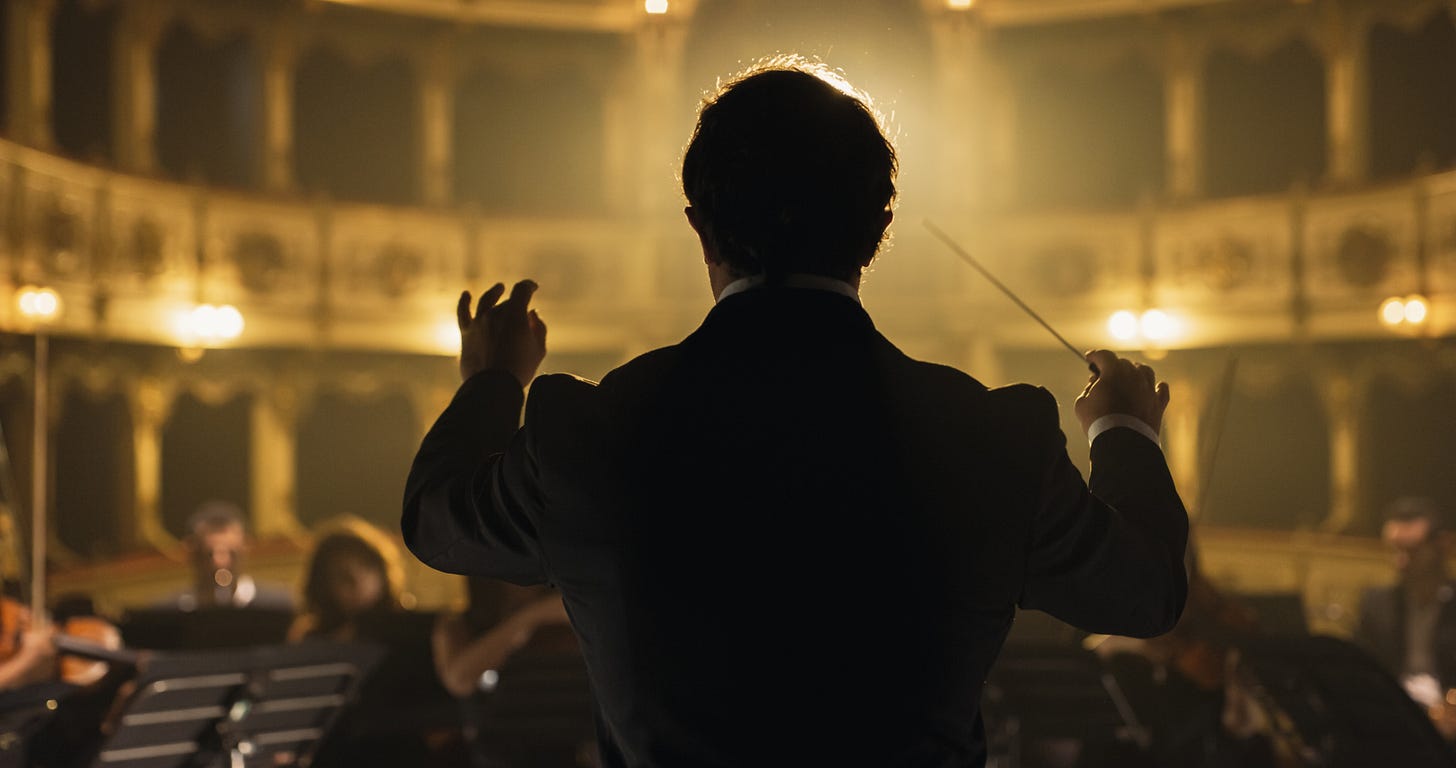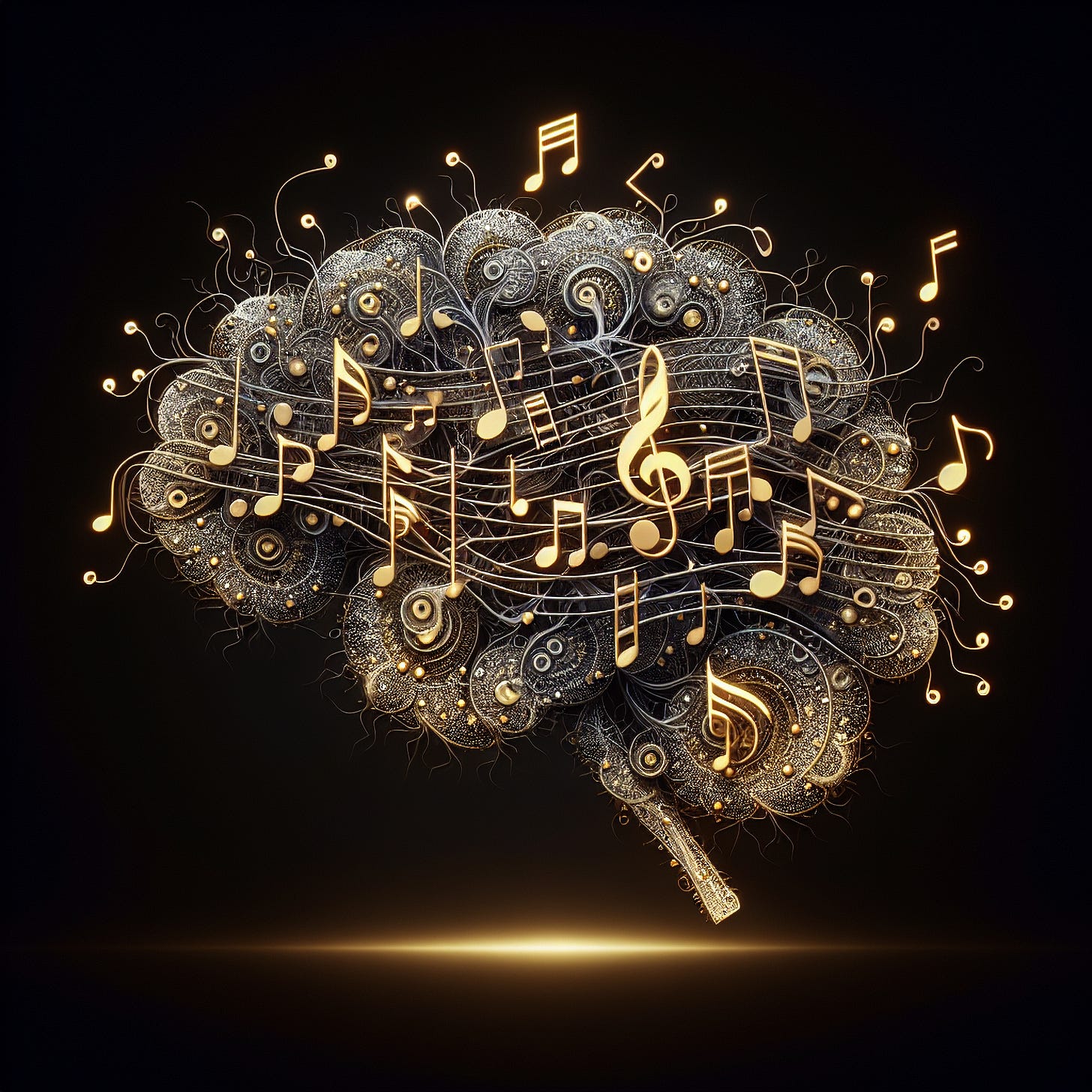The #1 Sound Your Brain Desperately Wants to Hear
This timeless practice has remarkable benefits for the human mind.
Every once in a while, you run into a new piece of information that really opens your eyes to a whole new world.
Today, I am taking a break from the regular news cycle to bring you something that really rocked my world: this Epoch Times article on classical music.
Now, before you close this page, thinking this Substack will be a waste of time, give me just two short minutes to prove why you are wrong.
It turns out the “Mozart effect” truly exists, and you don’t have to be a musician to reap the benefits. Take dementia patients, for example.
Professional violinist Ayako Yonetani told The Epoch Times that when she performs for people with dementia, something remarkable happens: they often become more alert, are visibly moved by the music, and at times experience moments of clarity with their families again.
In one particular case, a gray-haired older woman, whose cognition was degraded to sitting motionless with her gaze lowered, suddenly had “her eyes brightened” as she tried to follow along with Yonetani’s performance.
The family reported that “They had never seen her react like this before,” but Ms. Yonetani says this was just one of many times where she noticed a staggering response in dementia patients.
The benefits extend beyond just people with dementia, and the more you expose yourself to classical music, the bigger the benefits become. When classical musicians undergo brain scans, what doctors discover is that certain parts of their brains barely shrink over time.
Specifically, when it comes to gray matter—the part of the brain responsible for processing information, remembering things, and managing emotions—symphony orchestra musicians had significantly higher levels, not just at age 65 but even earlier.
By the time you reach the age of 65, the difference between the two groups is about 70 cubic milliliters of gray matter (440 vs 370), or about 19% more for musicians.
Classical music has been shown to:
• Reduce epileptic brain activity in people prone to seizures
• Strengthen neural connections and improve the brain’s communication network
• Reduce stress, anxiety, and pain
• Improve mood
• Trigger pleasurable “chills” and activate the brain’s reward system
• And it can even make you appear more charming when played during social occasions (such as dates)
What Makes Classical Music Different?
You can think of classical music as kind of a “workout for your brain.” Unlike much of today’s popular music, it weaves together rapid passages, slow sections, and shifts from whisper-soft to megaphone-loud—all intricately connected within a single composition.
With most pop songs, one can often predict exactly how the rest of the song will unfold after hearing the first chorus—even on the very first listen.
That’s not the case with classical music.
It surprises you and stirs deep emotion as it carries you along on a journey. While classical music usually follows precise numerical patterns, the richness and variety within each piece keep the experience fresh and engaging.
Remarkable Lifelong Benefits
After reading The Epoch Times’ piece, I did more digging on classical music, and I was astounded by the benefits.
I always wondered why my high school friends who played an instrument went on to become highly successful engineers, accountants, and business managers, while those I played sports with were more hit-and-miss.
It turns out my anecdotal experience holds true on a national scale.
High school students who participated in an instrumental music program scored, on average, 63 points higher on the verbal section of the SAT and 44 points higher on the math section.
And here’s the stat that’s really profound. High school band members have an 88.4% chance of graduating from college, compared to the national average of just 60.4%. That’s nearly a 50% higher chance of graduating from college based on that one factor alone.
Even modest musical training can have lasting benefits. This study shows that people who had learned to play just a single instrument during childhood, more than 50 years later, still showed a measurable cognitive advantage over those who never played.
To sum it up, if you have a child and want them to succeed in life, encouraging them to learn how to play an instrument could be the most impactful educational decision you ever make as a parent.
Benefits of Listening
For listening, the benefits of classical music are modest when it comes to cognitive gains, but the improvements to anxiety, focus, and other areas are quite significant.
• A 2019 study found that daily classical music listening for two months led to a 12% drop in baseline (trait) anxiety in college students (statistically significant). In other words, their overall anxiety was lower throughout the day, not just while listening to the music.
•In 2021, a review of 12 studies found that listening to Mozart’s Sonata for Two Pianos in D major (K.448) reduced abnormal brain activity linked to seizures in 84% of people with epilepsy.
• A 2007 study found that simply listening to classical music in the background can also help the brain absord and interpret new information more easily.
• In 1993, Nature published a study showing that just ten minutes of listening to classical music can temporarily boost your spatial IQ by around ten points.
• A 2024 study found that patients with treatment-resistant depression had significant mood boosts after listening to classical music.
• Lastly, playing classical music before bed can help you fall asleep faster and improve sleep depth. One study noted that participants fell asleep 35% quicker with soothing classical tracks.
The #1 Benefit of Classical Music
Simply put, it’s fun—and that’s something I didn’t expect. After reading The Epoch Times’ piece on classical music, I decided to give the genre a try, even though I’d never had much interest in it before.
To my surprise, I recognized more songs than I expected… and found them incredibly satisfying to listen to.
After exploring classical music, it’s hard to go back to modern tracks. The variety in classical compositions is like a workout for the brain, constantly keeping it engaged.
Pop songs, on the other hand, get repetitive fast—and you can often predict how they unfold on your first listen.
Try this experiment: listen to Antonio Vivaldi’s Concerto No. 4 in F minor. It’s a journey from start to finish, a true work of art. Then play Katy Perry’s California Gurls and tell me it doesn’t feel like brain rot by comparison.
Getting Started
Humanity has made astonishing progress in science, technology, and medicine in recent decades. But more than 300 years after Bach first graced the world with his music, where we are now feels like a huge step backward.
The difference is so stark that it makes you wonder if today’s music is designed to be lacking substance on purpose.
As a newcomer to classical music myself, I recommend starting with these sources for your listening pleasure:









